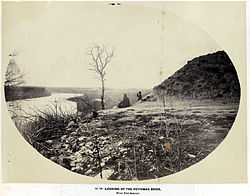Fort Sumner (Maryland)
| Fort Sumner | |
|---|---|
| Part of the Civil War defenses of Washington, D.C. | |
| Montgomery County, Maryland | |
|
View of the Potomac River from Fort Sumner]] | |
 Fort Sumner | |
| Coordinates | 38°57′19″N 77°07′26″W / 38.9554°N 77.1240°W |
| Type | Earthwork fort |
| Site information | |
| Controlled by | Union Army |
| Condition | Residential Area |
| Site history | |
| Built | 1861 |
| Built by | U.S. Army Corps of Engineers |
| In use | 1861–1865 |
| Materials | Earth, timber |
| Demolished | 1865 |
| Battles/wars | American Civil War |
Fort Sumner was built by the Union Army in Montgomery County, Maryland, just northwest of Washington, D.C.
Construction
It was an 1863 expansion of Fort Alexander, Fort Ripley and Fort Franklin, which were built to protect the Washington Aqueduct, the new water supply for the city, and the adjacent Potomac River shoreline.[1][2] Fort Sumner was named for Major General Edwin Vose Sumner, who died in 1863 from wounds received at the Battle of Antietam.[1]
The fort had a commanding view above the Potomac River and included 30 artillery pieces. In addition to the aforementioned components, the site included Battery Bailey and Battery Benson, overlooking Little Falls Branch.[3] Fort Sumner was razed in 1953.[4]
There are a few visible remains of Battery Bailey, in Westmoreland Hills Park, which can be seen from the adjacent Capital Crescent Trail.[3]
See also
References
- ↑ 1.0 1.1 Cooling, III, Benjamin Franklin; Owen, II, Walton H. (2009). Mr. Lincoln's Forts: A Guide to the Civil War Defenses of Washington. Lanham, MD: Scarecrow Press. pp. 144–149. ISBN 9780810863071.
- ↑ Historical Marker Database (2007). "Fort Sumner." Accessed 2013-02-18.
- ↑ 3.0 3.1 Coalition for the Capital Crescent Trail, Bethesda, MD. "Points of Interest on the Trail" Accessed 2013-02-18.
- ↑ Reinink, Amy (2012-11-02). "Fort Sumner is a Bethesda neighborhood full of traditions". Washington Post.
| ||||||||||||||||||||||||||||||||||
